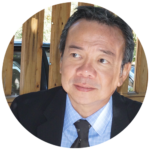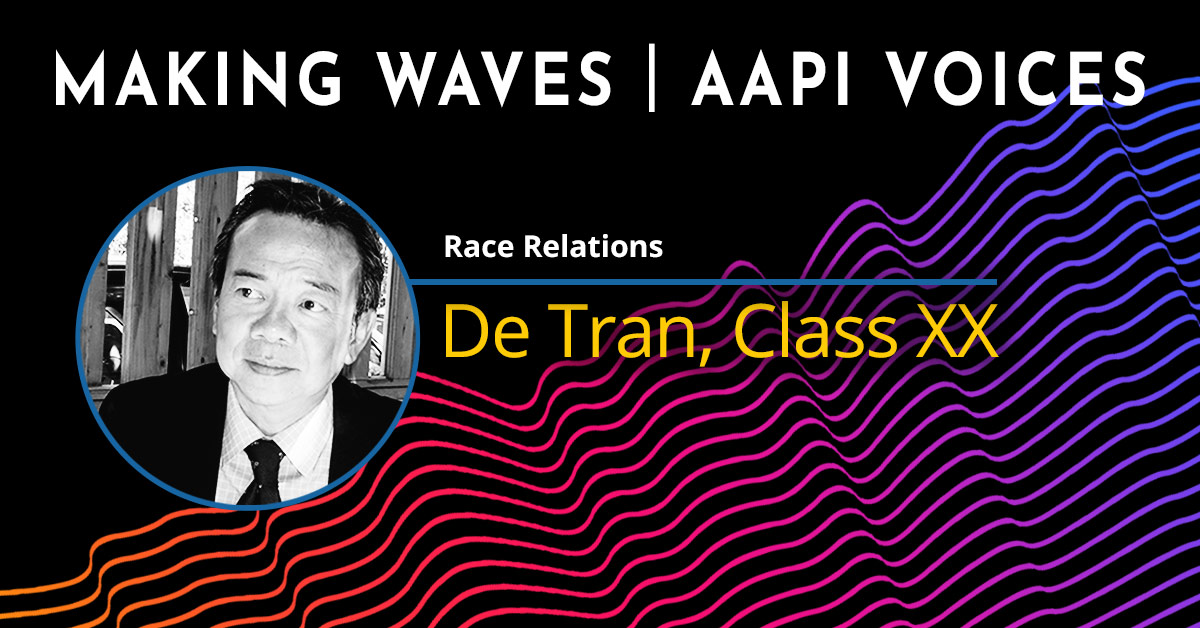Race Relations.
It has been more than 30 years, but I remember the details clearly. I was in Southern California for a job interview at the Los Angeles Times. The paper had flown me in a day early and put me up at the Westin. I had been a columnist for the San Jose Mercury News when a Times editor called and asked whether I was interested in coming down for a chat. The Times was the major league. I felt wanted. I was 28, and life was good.
That night, I went to an Italian restaurant near the hotel. I put on a dark blue Armani suit like it was dress rehearsal before the important interview. (OK, I was full of myself too.) I was by myself, so I sat at the bar, ordered a martini with a twist, and dinner. I think I was on my second drink when a white man of about 40, obviously inebriated, walked up and said loudly enough for everyone to hear: “You know, you’re lucky they let you into this country…” A blond woman a couple of stools away gasped. The bartender immediately tossed him out. The blond woman turned to me and apologized as though it was her fault. I remembered well the taste of fresh-baked focaccia with rosemary, olive oil and balsamic. I remembered well the ice-cold tingling of the Sapphire gin on my tongue as I savored the martini. But mostly, I remembered the casual hatred of the man’s words, a cruelty so matter-of-factly it was as if he was ordering a plate of fettuccine alfredo.
My story is not unique among Asian Americans or other people of color. You could be fully assimilated, wear designer clothes, speak English with no accent, attend the Ivies, vote in every election, but for some of us, you were still perceived as an incomplete citizen, and inchoate American.
Our family came to the United States at the end of the Vietnam War. President Gerald Ford, a Republican, opened the door for South Vietnamese evacuees as communist tanks rolled into Saigon. President Jimmy Carter, a Democrat, later granted refugee status to thousands of Vietnamese boat people. Immigration was not a partisan issue then.
“Becoming an American is a process of reinvention that involves more than ESL classes, history and civics lessons, or naturalization ceremonies. It’s also about understanding both F. Scott and Ella Fitzgerald, about Big Stick Diplomacy and the Big-Band Era, about the Miracle Mets and the Miracle on Ice.”
I picked up enough English to eventually work in mainstream media. I learned as much as I could about American culture and history, trying to grasp the nuances and depth of this elusive “Americanness.” Becoming an American is a process of reinvention that involves more than ESL classes, history and civics lessons, or naturalization ceremonies. It’s also about understanding both F. Scott and Ella Fitzgerald, about Big Stick Diplomacy and the Big-Band Era, about the Miracle Mets and the Miracle on Ice… I watched Bogart and Bacall, studied Mark Twain and Steinbeck and James Baldwin, and learned to throw the knuckleball. I even avoided wearing white after Labor Day. All these were attempts to belong, to fit in. Yet, throughout my career in media, I heard whispers and insinuations of being an “affirmative-action hire.”
The United States is the land of immigrants, of “give me your tired, your poor, / Your huddled masses yearning to breathe free,” yet the country has never quite reconciled with this founding creed, never quite atoned for its original sin of slavery, for its subjugation of the Native Americans. Racism is baked into its genome since its birth as a nation. The Chinese built the Transcontinental Railroad, but could not become citizens. The Nisei soldiers of the 442nd were the most decorated in World War II, yet their families were interned at Tule Lake and Manzanar… Asian Americans have always been seen as outsiders no matter how many generations they have been here. We are perceived as permanent foreigners. Don’t we, too, sing America?
I did get that job at the Times. One of the first stories I covered was about a local police department conducting profile stops of Asian youths in the area. The cops were accused of pulling over Asian kids “riding fours” in cars, making them sit on the sidewalk while officers rifled through their vehicles. The ACLU got involved and the practice eventually stopped.
At that time, the Rodney King riots had just occurred. Orange County was undergoing a demographic shift and not everyone was comfortable with all the changes. Fast forward to today…Charlottesville. George Floyd. Ahmaud Arbery. Martin Luther King’s Dream seems ever more remote.
Hate crimes against Asian-Americans have skyrocketed since the pandemic. According to researchers Denetra Walker and Allison Daniel Anders in an article published in the Sage Journals: “Since March 2020, Asian Americans have been continuously subjected to verbal and physical attacks, harassment, and discrimination in the United States and worldwide. Research from the Pew Institute indicates three in 10 Asian Americans have experienced racial slurs or jokes since the pandemic (Ruiz et al., 2020). Hate crimes against Asian American people have been documented at double and triple their rate in 15 major U.S. cities in comparative data from 2020 and 2021 (Yam, 2021), and Stop AAPI Hate, a national coalition, reported more than 9,000 incidents perpetrated from March 2020 to July 2021. The harassment and assaults perpetrated against Asian American people occurred in all 50 states of the United States (Yellow Horse et al., 2021) …”
“As a refugee, I know from experience that most people don’t want to leave their homeland, abandoning relatives and friends to come to a place with an alien language and culture, to start over in a place where they’re looked down upon and often abused. They leave because the alternative – whether it’s political or economic – is worse, much worse.”
The political theatrics around Covid hasn’t been helpful. Calling it “Kung Flu” or the “China Virus” is detrimental. An increasingly authoritarian China, and its Wolf-Warrior diplomacy, also contribute to the demonization of Asian Americans. The United States has emerged from the pandemic a more anxious place, unsure of its American exceptionalism, uncertain of its core values. Social media has become the Tower of Babel in our time, exacerbating our divisions instead of mending our differences. Xenophobia, as a result, is a predicate byproduct. Immigration becomes a convenient target because it conjures up foreignness, it symbolizes a restructuring of the status quo that jolts some out of their comfort zone.
In unsettling times, politics should unite us, help heal our collective soul. Instead, politicians have exploited our differences, pulling the band-aid off our psychic angst. Politicians, fueled by hyper-partisanship, are short on sensible solutions but long on the fomentation of outrage and grievances. Asian Americans have become a collateral damage in these unsettling times…murders in Oakland’s Chinatown and robberies in San Jose’s Little Saigon…many other racial incidents probably went unreported. A few weeks ago, a Chinese American friend was assaulted as he was walking to his home in San Francisco. In a text to me, with his usual graciousness, he first sent regards to my wife, and then said: “I need a fine cigar. I’m recovering,” he texted me. “Pain pills and possible surgery. Long healing process…”
Another friend attended a recent fundraiser for the San Francisco Ballet, where its principal dancer, the Shanghai-born Yuan Yuan Tan was honored. A corporate sponsor handed out whistles to guests for emergency use in case of threat.
While no panacea exists for all the racial issues of our time, some measure may help.
Perhaps, we should tone down the rhetoric and the anger in our politics. Our nation is no longer segregated by skin colors, but by identity politics, by the hyper-partisanship that divides us into Red and Blue tribes, preventing us from reaching common grounds and compromises.
A coherent and sensible immigration plan might help too. The United States, like many countries, is undergoing a population decline; we need a steady resupply of labor to sustain our economy. At the very least, we should craft a pathway for Dreamers to be a part of our society.
Demonizing immigrants – both legal and illegal – deters us from our quest for a more perfect union. As a refugee, I know from experience that most people don’t want to leave their homeland, abandoning relatives and friends to come to a place with an alien language and culture, to start over in a place where they’re looked down upon and often abused. They leave because the alternative – whether it’s political or economic – is worse, much worse. I’m forever grateful that America had adopted our family, that we won the immigration lottery, but those first days in the new country were difficult with little money, few friends, and a complicated new language and culture to learn.
“Still, I believe that it is our calling to leave a better America to the next generation, our responsibility to elect a government that promotes tolerance instead of wedge issues, our duty to get to know our neighbors and friends better because we will learn empathy and humanity from their struggles and aspirations.”
The United States is a concept forged from the struggles of the New World’s first undocumented immigrants – the Pilgrims. It is a republic created from the Revolutionary War and the Philadelphia Constitutional Convention. It is a working laboratory constantly refining its democratic ideals, a superpower in search of its identity, its Americanness. Is e pluribus unum still relevant? Can we still be a nation capable of inventing the airplane and automobile, of launching Apollo 11 and Silicon Valley, of defeating Hitler and other iterations of tyranny? Are we still not the world’s beacon of hope and freedom?
I sometimes think back to that incident in the restaurant and regret that not much has changed in the three decades since. The country has become more diverse and inclusive, yet at times it’s gotten more intolerant and hateful. Still, I believe that it is our calling to leave a better America to the next generation, our responsibility to elect a government that promotes tolerance instead of wedge issues, our duty to get to know our neighbors and friends better because we will learn empathy and humanity from their struggles and aspirations. I’m hopeful because a country that once had separate drinking fountains is also capable of electing a Barack Obama, capable of redressing for its past sins. Its pendulum sometimes swings toward the darker corners of its history, but its corrective actions also “bend toward justice.”
America is not perfect, but it does strive to be a more perfect union.

De Tran is an ALF Senior Fellow from Class XX and former staff writer for the Los Angeles Times and San Jose Mercury News.
About Making Waves | AAPI Voices
This article is part of the Making Waves – AAPI Voices project by ALF Silicon Valley’s AAPI Caucus. Through an ongoing series of letters and other forms of creative expression by ALF Senior Fellow guest contributors, we aim to share the experiences of Asian Americans & Pacific Islanders (AAPIs) with the broader ALF network. We are proud of AAPIs’ contributions to our multiracial society and believe we can help strengthen our community and democracy by sharing our stories to build understanding and solidarity.
View all current contributions to this series here.
The title of this project, Making Waves – AAPI Voices, is inspired by the book Making Waves, An Anthology of Writings By and About Asian American Women. We thank editor Dr. Elaine Kim and Asian Women United of California for their groundbreaking work and permission to use the title.
Tell us what you think. Want to start a dialogue? Contact Akemi Flynn.




